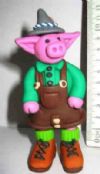|
ESL Forum:
Techniques and methods
in Language Teaching
Games, activities
and teaching ideas
Grammar and
Linguistics
Teaching material
Concerning
worksheets
Concerning
powerpoints
Concerning online
exercises
Make suggestions,
report errors
Ask for help
Message board
|
ESL forum >
Grammar and Linguistics > sentence structure
sentence structure
|

liewsusfah

|
sentence structure
|
|
(a) I want to be a soldier like my father was.
(b) I want to be a soldier like my father did.
(c) I want to be a soldier like my father.
By the way, which is the correct usage ? May someone help, pls? |
21 May 2013
|
|
|
|

MoodyMoody

|
|
A and C are both correct, but the meanings are slightly different. B is wrong. A is correct because the infinitive "to be" matches the verb "was" in the dependent clause. This means that father is no longer a soldier. B is wrong because "be" is the only verb in English that does not use "do" as a helping verb in the negative, question, or emphatic forms. C implies that father is still a soldier. I hope this helps.
|
21 May 2013
|
|
|

liewsusfah

|
Can i say
d) I want to be a soldier like my father is.
e) I �d wanted to be a soldier like my father was.
|
22 May 2013
|
|
|

yanogator

|
|
Yes to both d and e. I agree with MoodyMoody about A and C.
Bruce |
22 May 2013
|
|
|

anaram

|
In formal written English, "as" is used instead of "like" as as conjuction. In your examples, only C uses "like" as a preposition. So, if it is a test with all those options, I would choose C. The other options moodymoody and Bruce said are, of course, perfectly aceptable in spoken English and in not very formal written language.
You can see explanation and examples in OALD
Ana
|
22 May 2013
|
|
|

FrauSue

|
|
I �m not a soldier yet, but my father is a soldier: I want to be a soldier like my father (is). I �m not a soldier yet, and my father is no longer a soldier: I want to be a soldier like my father (was). I am now a soldier, and am explaining my motivation OR I wanted to be a soldier when I was younger, but don �t want to be one now: I wanted to be a soldier like my father (is/was). |
22 May 2013
|
|
|